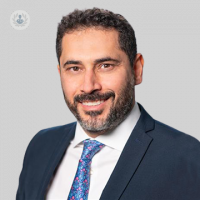Adrenalectomy: An expert guide
Written in association with:Surgery to remove one or both adrenal glands in a procedure known as adrenalectomy may be required for a number of reasons, including complications from Cushing’s syndrome or a tumour in the area. In this informative guide, highly respected consultant thyroid and endocrine surgeon Mr Tarek Abdel-Aziz offers expert guidance and reassurance on what to expect from adrenalectomy.

What are the most common reasons that patients require an adrenalectomy?
There are a number of reasons that a patient may require an adrenalectomy, which is a surgical removal of one or both adrenal glands.
A CT scan which shows an abnormally enlarged adrenal gland, especially if larger than 4cm or carrying suspicious features, may indicate surgical removal of the gland. Additionally, several conditions where the body produces excessive hormones may require an adrenalectomy, including:
- Primary hyperaldosteronism, also known as Conn’s syndrome, where excessive aldosterone is produced
- Cushing’s syndrome, where the body produces too much cortisol
Phaeochromocytoma, a tumour in the adrenal gland may also require surgical treatment. This type of tumour can cause the body to produce excessive adrenaline but may also be malignant (cancerous). Cancer of the adrenal gland requires surgery to reduce the risk of over-secretion of harmful adrenal cortex hormones and of metastases (spreading of the cancer to other parts of the body). Similarly, cancers in other parts of the body can spread to adrenal gland.
What can patients expect on the day of their procedure?
Adrenal surgery is performed under a general anaesthetic (meaning that the patient will be completely asleep during the procedure). The patient will fast the night before but certain medications might be required on the morning of surgery depending on the consultation with the anaesthetist during the preoperative assessment appointment. The patient will usually spend one or two nights in hospital. Only in some cases, it is necessary to spend the first night in the intensive care unit.
Are minimally invasive techniques used? How does this impact safety and recovery?
Yes, more than ninety-five per cent of adrenal operations are completed using keyhole surgery (laparoscopic adrenalectomy), which is performed through 3 or 4 small incisions under the rib cage. Most studies have shown than the laparoscopic approach reduces muscle trauma which is associated with open surgery causing less pain, and earlier recovery to allow patients to get back to their lives as soon as possible. Keyhole surgery is also associated with a much better cosmetic effect.
What is recovery like following an adrenalectomy?
Following an adrenalectomy, you will be moved to a recovery room and then return to your ward where regular blood pressure, pulse and oxygen levels will be checked. Postoperative pain is usually around the incision sites which are used to introduce the instruments for keyhole surgery and is easily controlled using pain killer tablets. You will be encouraged to get out of bed with the help of a nurse and to slowly mobilise until you are fully independent. You will need to have a blood test the next morning to check that the other adrenal gland is producing enough hormones that the body needs.
How is life different following an adrenalectomy?
Following discharge from the hospital, you will need a period of two weeks to recover at home but you may feel well enough to go back to work before the end of this time. Wound infections are not common after adrenalectomies and can easily be treated with antibiotics if they occur. If the other adrenal gland is not producing enough hormones then you may need to take a special hormone tablet for a period of time until the function is recovered. This happens in patients with Cushing’s syndrome.
Mr Abdel-Aziz is one of the UK’s leading consultant thyroid and endocrine surgeons. If you require adrenalectomy and wish to schedule a consultation with Mr Abdel-Aziz, you can do so by visiting his Top Doctors profile.


